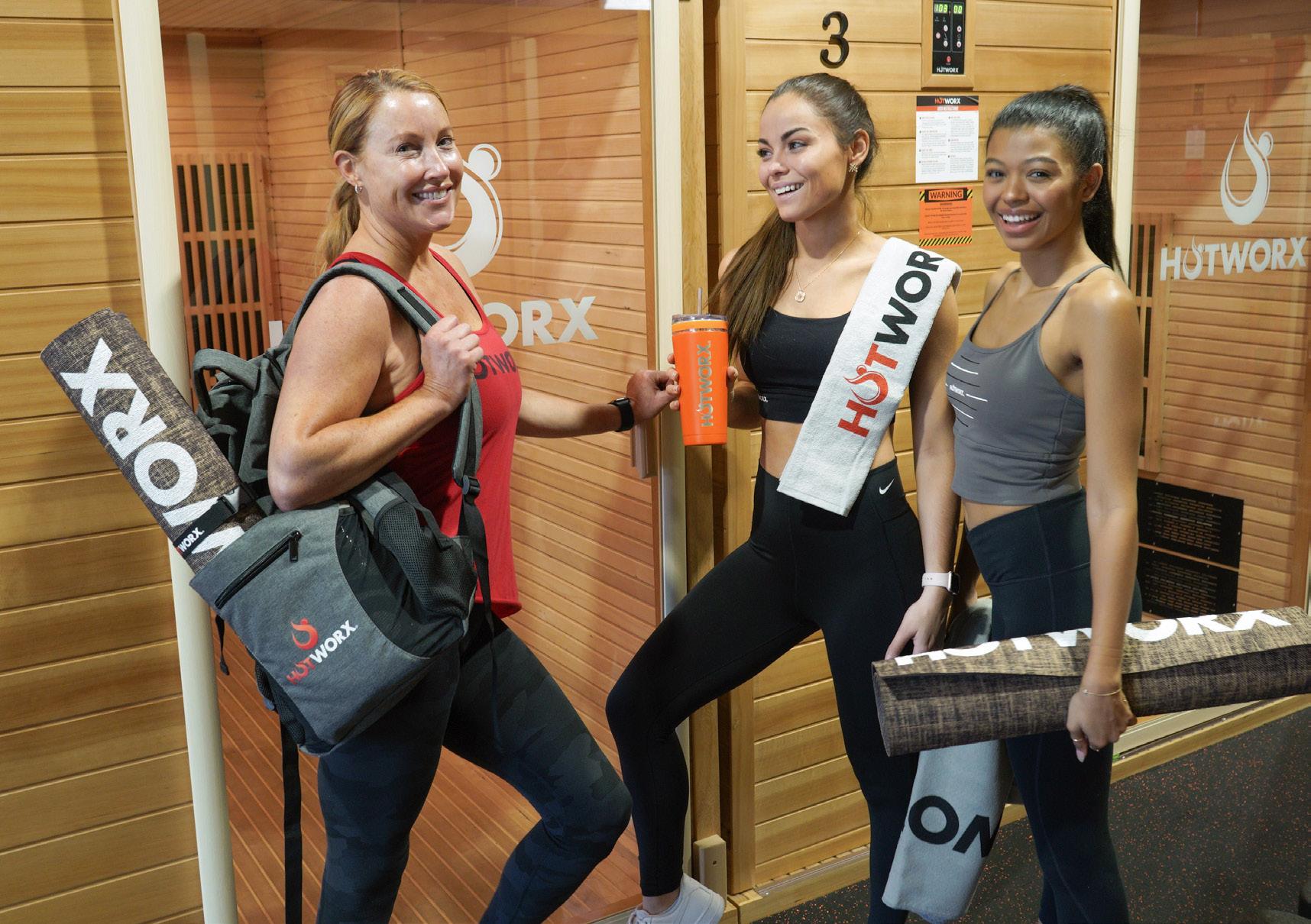MISSISSIPPIAN THE Daily
Thursday, October 30, 2025

Thursday, October 30, 2025
The vice president and TPUSA CEO appeared on the University of Mississippi campus for the “This is the Turning Point Tour.”
AIDAN
PONIATOWSKI News Editor
More than 9,500 people packed The Sandy and John Black Pavilion on the University of Mississippi campus Wednesday, cheering and chanting as Vice President JD Vance and Turning Point USA CEO Erika Kirk headlined TPUSA’s “This is the Turning Point Tour.”
Both exhorted students and community members to honor America by pursuing Christian civic values.
“This generation inside of America — remember who she (America) is, or she’ll forget,” Kirk said. “I believe with all my heart that God placed you here, now, not by accident, but by assignment. There is no mistake that you are here in this stadium.”
Vance referenced Charlie Kirk, Erika Kirk’s late husband who was murdered on Sept. 10 at a Utah Valley University event, throughout his speech, and he messaged to students that they should invest in family.
“Charlie wanted you, more

than anything, to invest in the things that were worth having, to build a life that was worth building,” Vance said. “The
JESSICA JOHNSON
Assistant A&C Editor
The University of Mississippi College Democrats, alongside several other organizations, hosted the Mississippi Rise Up Town Hall at the Gertrude C. Ford Ole Miss Student Union on Wednesday in response to the Turning Point USA event on campus that featured Vice President JD Vance and TPUSA CEO Erika Kirk.
“We need to build a coalition of love and people who have love and respect every human being, not just hate and demonizing,” Tennessee House Rep. Gloria Johnson, who was a featured speaker at the event, said. “They only win by divide. That is the only way they win because this is not left or right. This is not Republican or Democrat. It’s right and wrong. It
is the billionaire against the rest of us, and they know there’s a hell of a lot more of the rest of us.”
Joining the College Democrats in organizing the event were other groups including the Environmental Coalition, UM Forward, Southern Progressives Alliance, UM Community Alliance Network, Lafayette County Democratic Party and United Campus Workers. Other featured speakers included UM Associate Professor of Sociology James Thomas, California Rep. Ro Khanna, D-Calif., former U.S. Sen. Heidi Heitkamp, D-N.D., and Associate Professor of Rhetoric and Composition at the University of North Georgia Matthew Boedy. Khanna, Heitkamp and Boedy joined the conversation via video conferencing.
SEE TOWN HALL PAGE 7
most important advice he ever gave you was: ‘Fall in love, get married and start a family.’”
During a question-and-an-

WEEKLY RESET
swer session with students, Vance focused on political issues like immigration, U.S. involvement in Iran and Is-
UM students share how they prepare for the week ahead starting at home.
SEE PAGE 4
RAEGAN SETTLE Managing Editor
Oxford developer JW McCurdy withdrew his application to rezone property for a proposed asphalt plant near Taylor, Miss., on Tuesday, Oct. 28, following weeks of community resistance.
McCurdy, owner of MR Construction, announced plans in a press release Tuesday afternoon to relocate the proposed plant — Magnolia Materials — from the original planned site on Mississippi Highway 328 to the Max D. Hipp Lafayette County Industrial Park north of Oxford off County Road 101.

rael and deployment of military troops in American cities, while Kirk focused on the TPUSA’s goals for mobilizing youth leaders across the country and her family’s faith that has guided their mission. Students braved the rain and cold temperatures on Wednesday morning to line up early for the event. A campus-wide statement from Provost Noel Wilkin on Monday, Oct. 27, said that the queue for the event would open at 11 a.m., but students could be seen lining up as early as 10:15 a.m.
Bella Barron, a senior integrated marketing communications major from Austin, Texas, waited in line for four hours before the pavilion doors opened at 3 p.m.
“We are going to camp out early just so we can be front row,” Barron said. “The first 500 people get signed hats and everything. I mean, I want to be super close and see it all, (and) be able to see everything.”
Before TPUSA founder
GRAD HOUSING
Graduate students discuss some of the difficulties they face with housing.
SEE PAGE 5

“I’ve lived in this county my whole life, and I plan on living here the rest of my life. Our site on (Highway) 328 is an outstanding industrial node, and that’s not changing, but I’m also happy to change for the sake of peace,” McCurdy said in the press release.
Last week, opponents of the site on Highway 328 delivered two hours of public comment before the Lafayette County Board of Supervisors, resulting in a decision to table the vote on the rezoning until the next board meeting on Nov. 3. The vote will no longer take place. The original proposed location was across the highway
Charlie Kirk was killed Sept. 10 during an appearance at Utah Valley University, he was scheduled to lead a TPUSA event at Ole Miss. In October, it was announced that Vance and Erika Kirk would speak at the scheduled Ole Miss event, their only appearance on the tour.
What Vance and Kirk said
Vance was welcomed to the stage with “USA” chants from the crowd, after which he led the audience of more than 9,500 in a “Hotty Toddy” chant.
Vance first spoke about Charlie Kirk’s political legacy, recalling the events and his feelings as the news of Charlie Kirk’s shooting rolled in. Vance praised Charlie Kirk’s ability to debate and called him one of the most effective personalities in politics.
After Vance’s remarks, the event segued into a question-and-answer format, echoing Charlie Kirk’s style. Topics addressed by Vance included immigration, abortion, Vance’s relationship with defense technology corporation Palantir, Christianity’s role in society, gun rights, the deployment of the National Guard to U.S. cities, the ongoing government shutdown and the United States’ relationship with Israel.
Vance concluded the event by harking on the importance of debate and participation in democracy.
“Despair is a sin. Don’t give into the sin of despair. Let’s keep
fighting to save America,” Vance said in conclusion of the event.
Erika Kirk, who spoke before Vance, was emotional as she came onto the stage, which she attributed to the introductory video featuring clips of the Kirk family. She shared her experience following her husband’s murder and the absence she has felt as a result of his death.
She then pressed on the need to keep the TPUSA movement alive, calling Generation Z the “courageous generation.” Erika Kirk used spiritual themes to implore attendees to fight against the work of “the enemy.”
Junior public policy leadership major Lesley Lachman, president of Ole Miss TPUSA, opened the event by expressing gratitude for the communities that helped her become a leader and helped her plan this event — TPUSA, the UM Declaration of Independence Center for the Study of American Freedom and Chancellor Glenn Boyce.
Audience reactions
Reese Rabe, a senior public policy leadership major from Sulphur Springs, Texas, said the event was an opportunity to be surrounded by like-minded people.
“I love seeing the support. The people are willing to go through the cold weather and the rain,” Rabe said. “You’re able to see so many like-minded people, so many different backgrounds, especially people our age. It gives a lot more hope for our generation and the future generations.”
Cincinnati native Maddie Boone, a senior finance major at UM, expressed her


excitement for Vance’s arrival on campus, as well as her support for the gathering.
“JD Vance actually lives 15 minutes away from me, so I think it’s super cool to see him here in my college town,” Boone said. “The reason I’m going is because I really like the community coming together. It really makes me feel seen, and Charlie Kirk’s death really affected me. So seeing everyone come together in a positive way is really a good feeling, uplifting.”
Kaylee Nye, a senior integrated marketing communications major from Seattle, believes Vance’s appearance was an honor.
“I think it’s really important for both sides just because it’s a huge honor that out of all of the places that the vice president of the United States could have come, he decided to go to Ole Miss,” Nye said. “It’s such a small place and small town, and after this they’re done — they’re not going to any other colleges, like (they’re) not going to Auburn or anything, so I think it’s a huge honor that we were even considered to be a school that they thought of coming to.”
As Vance and Kirk were speaking at the TPUSA event,
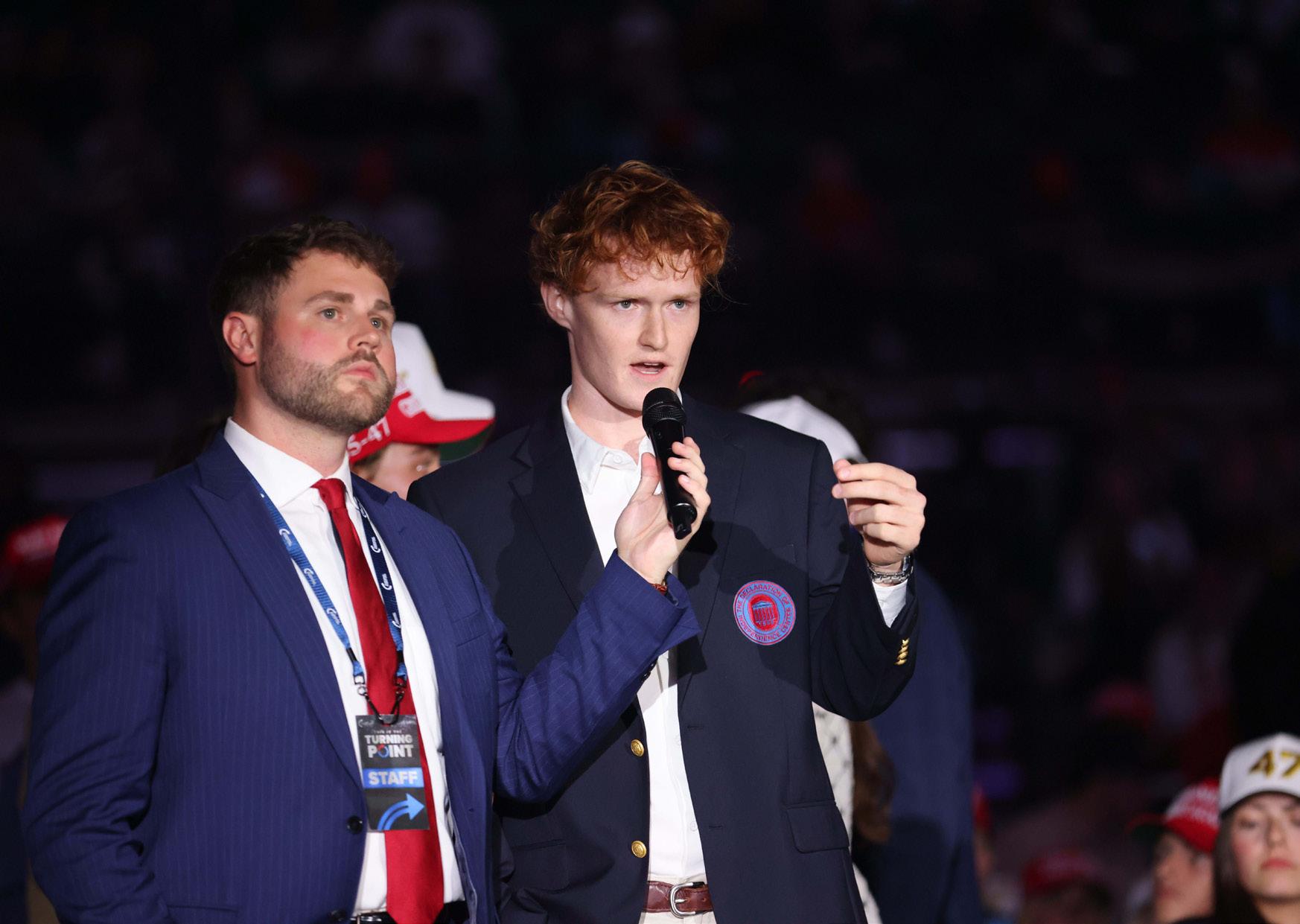
the UM College Democrats, along with several other organizations, hosted the Mississippi “Rise Up Town Hall” at the Gertrude C. Ford Ole Miss Student Union Ballroom.
The event featured appearances from Tennessee House Rep. Gloria Johnson and UM Associate Professor of Sociology James Thomas. U.S. Rep. Ro Khanna, D-Calif, and former U.S. Sen. Heidi Heitkamp, D-N.D., joined the event via video call.
Participants like Sophie Kahle, junior political science and psychology major from Ocean Springs, Miss., found the event an enjoyable space to share beliefs.
“I think it’s important to really be surrounded by a sense of community. Especially where we are in the South, it’s hard to find that sometimes,” Kahle said. “And with the political climate being what it is, I think it’s important to celebrate what we can, and I think tonight is a really good representation of that.”
The event attracted a heightened security presence — a collaborative effort between several local, state and federal police agencies, including the University Police Department, the Lafayette County Sheriff’s Department, the Mississippi Department of Public Safety and the Transportation Security Administration.
Canine units from the United States Secret Service Canine Explosives Detection Team were deployed to detect traces of weapons, and all attendees were required to go through TSA metal detectors prior to entering the building.
Roads and buildings close to the pavilion were closed leading up to the event, with portions of Hill Drive and All American Drive closed for logistical and safety reasons. Oxford-University Transit routes were also altered to avoid areas close to the event. The pavilion parking garage and lots around the Turner Center were also closed prior to and during the event, and are set to reopen Thursday morning.
This increased presence eased safety concerns.
“I feel really safe. I think they’ve got this place well guarded, and they know what
to expect,” Boston McCrory, a sophomore accounting major from Mississippi State University, said. “The only thing I could complain about is the parking situation.”
Why Ole Miss?
Vance and Kirk’s stop at UM is the only one for either on the “This is the Turning Point Tour.” Lachman said that she attended AmericaFest last year, an annual conference held by TPUSA. At the event, Charlie Kirk cited UM as an example of a university that aligns with the organization’s values.
From there, Lachman wanted the university to host Kirk and TPUSA events. She shared how bittersweet the night’s event was, due to the nature of Kirk’s death.
Talia Fields, a sophomore early childhood education major from Hershey, Pa., thought Kirk and Vance represented the UM community well.
“I think (Kirk and Vance) represent a lot of the traditional values here we have on campus, and I think it was really admirable when they could come, especially after this tragedy with Charlie Kirk, and carry on his legacy and allow us to be the first to really show and do the same thing.”
Chancellor Glenn Boyce attributed the visit to the university’s growth in national reputation.
“I just think that the trajectory of this university and the national visibility this university has gotten over the last five-tosix years in particular (is why Vance and Kirk spoke at UM). … I think as much as anything, we are now truly on a national map in many ways,” Boyce said. “This isn’t just our wonderful athletic program that has given us a lot of visibility — it’s the research we’re doing, it’s a tremendous faculty, who are taking students to a brand new level of academic achievement.”
Erika Dierke, Gabby Franklin, Clay Hale, Kenzie Hall, Madelyn Lass, Raegan Settle and Dylan Thomas contributed reporting.
RAEGAN SETTLE
Managing Editor
Vice President JD Vance and Turning Point USA CEO Erika Kirk encouraged students to embrace conservatism and the Christian faith as core tenants of American values during their appearance on the “This is the Turning Point Tour” at the University of Mississippi Wednesday night.
Vance focused primarily on immigration, while Erika Kirk shared her hopes for young people and the legacy of her husband, TPUSA founder Charlie Kirk, who was assassinated at Utah Valley University on Sept. 10.
In her introductory speech at the event, Erika Kirk said she believes that Gen Z is the “courageous generation.” She called the gathering of students, who waited hours in cold and rainy weather to attend the TPUSA event, a “revival.”
“This generation inside of America — remember who she (America) is, or she’ll forget,” Erika Kirk said. “I believe with all my heart that God placed you here, now, not by accident, but by assignment. There is no mistake that you are here in this stadium.”
Kirk largely spoke about the work of “the enemy,” or Satan. Her discussion of religious values was emblematic of TPUSA’s mission.
“I still believe in (America.) I still believe in her founding. I still believe in her future,” Eri-
ka Kirk said. “I don’t care if people think it sounds crazy, but I still believe that our nation can heal, but we can’t save a country that we’re too afraid to defend.”
What she was referencing that America must heal from was never explicitly stated, but she repeatedly pointed to sin and evil as crippling points affecting the political and social health of the United States.
“The fight for freedom starts within every one of you. … Please stand firm against the wickedness of the devil and of the schemes of man,” she said.
Vance followed Kirk’s speech by discussing his relationship with Charlie Kirk and participating in a live question-and-answer session with students.
During the question period, Vance addressed a multitude of political issues, including the current government shutdown, the Trump Administration’s deployment of military troops to U.S. cities, merit-based immigration, separation of church and state, artificial intelligence and surveillance, his stance on abortion and his faith.
Vance paid the most time discussing legal versus illegal immigration. He believes his responsibility as vice president is to make the “American dream” as accessible as possible. The best way he can do that, Vance said, is to fight against illegal immigration.
“I believe that when you let in a flood of illegal immigration,
what it does is it drives down the wages of young people and makes housing unaffordable for the entire American population,” Vance said.
The sheer magnitude of illegal immigrants in the United States, Vance said, is cause for great concern. He noted that his best guess is 25-30 million illegal immigrants currently live in the United States and said he has heard estimates as high as 50 million. Pew Research Center estimates while illegal immigrant numbers reached a record 14 million in July 2023, July 2025 estimates are higher.
“Many immigrants do enrich the United States of America. But here’s the problem we’ve got — we don’t even know how many illegal aliens we have,” Vance said. “You’ve got to allow your own society to cohere a little bit, to build a sense of common identity for all the newcomers, to assimilate the ones who are going to stay into American culture. Until you do that, you’ve got to be careful about any additional immigration.”
On merit-based immigration, Vance said that immigrants should have special capabilities and not replace the jobs of equally qualified American workers. He criticized the use of H-1B visas to employ foreign workers for cheaper wages. The H-1B visa allows U.S. employers to hire foreign workers in specialty occupations.
“If you look at the H-1B visa, … what it’s supposed to be is that (if) you have a super genius who’s

THE DAILY MISSISSIPPIAN EDITORIAL staff
CLAY HALE editor in chief dmeditor@gmail.com
RAEGAN SETTLE managing editor dmmanaging@gmail.com
SYDNEY STEPP copy chief thedmcopy@gmail.com
CAMERON LARKIN digital editor dmdigitaleditor@gmail.com
AIDAN PONIATOWSKI news editor thedmnews@gmail.com
NOAH WALTERS assistant news editor thedmnews@gmail.com
JAYLYNN CONNER arts and culture editor thedmfeatures@gmail.com
JESSICA JOHNSON assistant arts and culture editor thedmfeatures@gmail.com
RUSS EDDINS sports editor thedmsports@gmail.com
NATE DONOHUE assistant sports editor thedmsports@gmail.com
KADIN COLLIER opinion editor thedmopinion@gmail.com
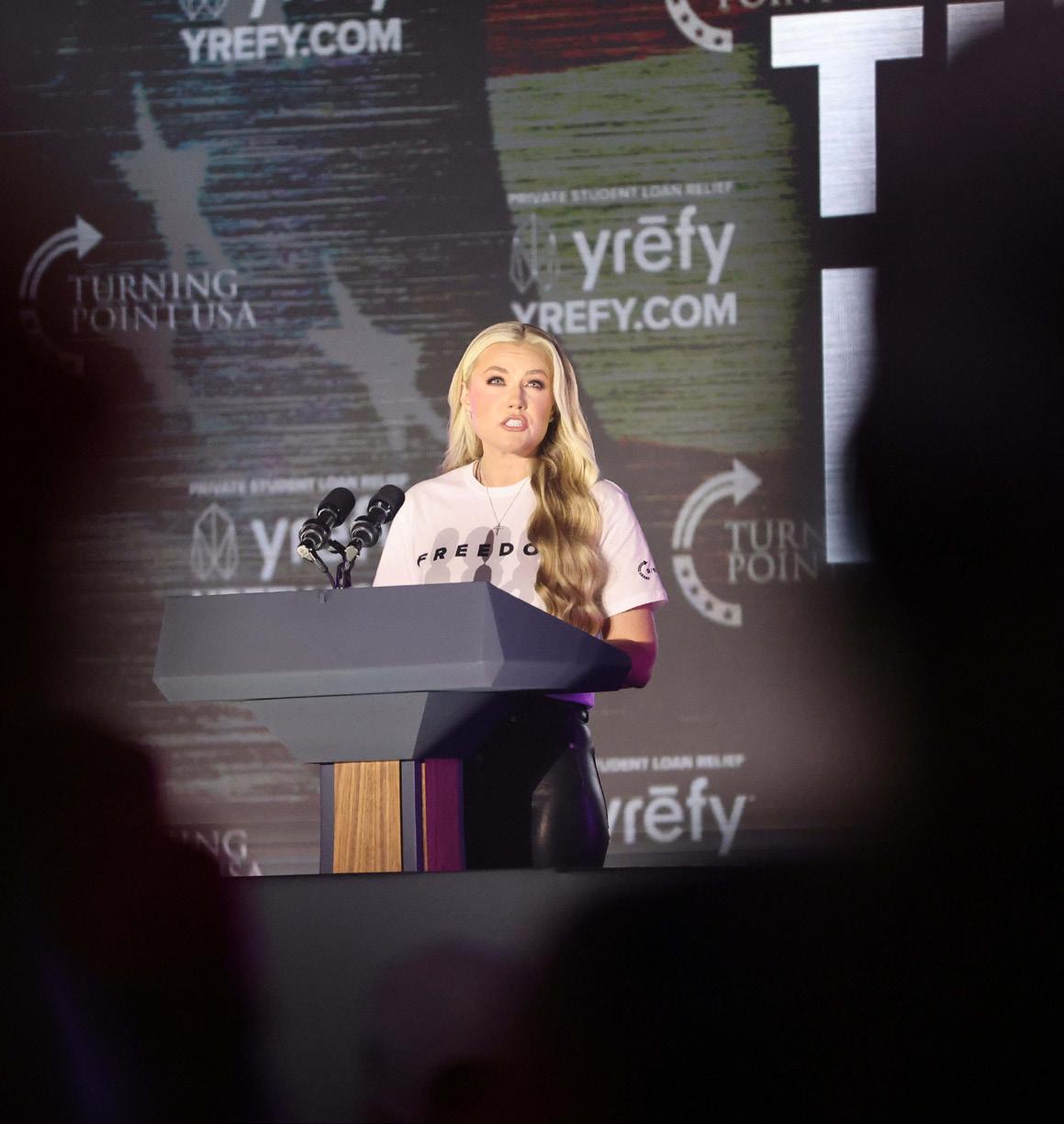
studying at an American university, who’s working at a great company, you want that super genius to stay in the United States of America and not go somewhere else,” Vance said.
Acknowledging that many students in the audience did not fully agree with his stance on immigration, he stressed his main goal at the center of the issue.
“Our immigration policy is not about hating immigrants,” Vance said. “We don’t hate anybody. We love our fellow citizens. … We want them to have the ‘American dream.’”
Vance also made points about Charlie Kirk’s legacy of political debate. Vance called Charlie Kirk the most effective person in politics that he had ever seen, calling him a dear friend with whom he exchanged frequent phone calls about current events.
“Charlie wanted you, more than anything, to invest in the things that were worth having, to build a life that was worth building,” Vance said. “The most important advice he ever gave you was: ‘Fall in love, get married and start a family.’”
Erika Kirk’s speech was also an elegy to her husband. She reflected on the day’s symbolism in reference to Charlie Kirk’s death, also on a Wednesday.
She thanked the members of the Ole Miss TPUSA chapter, calling them the “heart-
beat of this organization.”
“You guys have no idea how helpful it is to have all of you in my life, because you have helped me feel even more connected to my husband,” Erika Kirk said.
Charlie Kirk had three written questions positioned on his desk that he read every day before his death, she said: “What is something I can do for someone today?” “What is something I can do to add value to the world today?” and “How can I honor God today?”
“Ask yourself those questions every single day, and you will get courage,” Erika Kirk said, addressing a question she is frequently asked of how someone can act to be more like her husband.
She urged students to consider wisely how they spend their time, calling on the audience to remember the principles of faith and patriotism that TPUSA embraces.
“Love family carelessly. Love your spouse fearlessly. Love this country. … Defend her and serve her God, and don’t think that it’s someone else’s role to do it. You do it. Do it for Charlie,” Erika Kirk said.
THE NEWS DESK AT thedmnews@gmail.com
OLIVIA CANGELOSI photo editor thedmphotos@gmail.com
JOURNEY GLOVER assistant photo editor thedmphotos@gmail.com
MADELYNN LIBERTO design editor thedmdesign@gmail.com
FARIDA BELAL assistant design editor thedmdesign@gmail.com
MARY EVANS multimedia coordinator dailymissmedia@gmail.com
AVERY THOMAS social media manager thedmsocialmedia@gmail.com
CADENCE MANNING assistant social media manager thedmsocialmedia@gmail.com
S. Gale denley student media center
LARZ ROBERTS Director of Student Media
DENNIS MOORE Editorial Director
MADELYN LASS A&C Staff Writer
Before the beginning of a new week, many students in Oxford practice weekly-reset routines to organize their living spaces, clear their minds and prepare for classes.
Students have their own routines and motivations, but all methods of resetting ultimately aim for the same goal of a clean slate for the upcoming week.
“I’ll usually focus on cleaning my room first,” Aneta Kukuckova, a sophomore biological science major, said.
“And then I’ll move on to common spaces like the kitchen or living room. It is nice to walk into a clean space.”
Kukuckova lives at the Archive Oxford apartment complex. She said that living in a tidy environment allows her to feel organized and focused. Kukuckova’s weekly routine includes organizing school materials, doing laundry and treating herself to a spa day.
“If I’m in a clean space, I’m not so stressed and unorganized like I would be if there (were) trash and clothes lying around,” Kukuckova said.
Charlie Greaves, a freshman biological science major, said
he does a weekly reset in his dorm every Sunday. Greaves’ typical reset routine involves attending church, taking a nap and cleaning his dorm room.
Greaves lives in Residential Hall Two. He said cleaning his room means less stress and more relaxation throughout the week.
“I feel like I can relax after I clean,” Greaves said. “I feel like I can’t start doing things until I’m in a clean environment.”
Greaves said his best tip for other students is to be consistent with cleaning.
“Clean your rooms once a week,” Greaves said. “They will get dirty very easily, and it will bother you when you’re stressed. It will just become one more thing to do on your list.”
Anna Claire Donham, a sophomore biological science major, said that cleaning her house is a calming experience. She typically resets on Sunday, and her routine entails doing laundry, cleaning the dishes and vacuuming.
“Cleaning is calming for me,” Donham said. “It lets me have a clean space for the coming week. I don’t like to live in chaos.”
Donham said that her biggest tip for other students is to put on some form of en -
tertainment while you clean.
“My tips would be to just put on music or a show,” Donham said.
Weekly resets are not just for cleaning. Some students enjoy practicing self-care to de-stress and relax, choosing to physically reset their bodies along with resetting their living spaces. Self-care can range from doing something you enjoy to taking care of your body and mind.
“I usually treat Sundays as a spa day for myself,” Kukuckova said. “I like to do a physical reset, as well.”
Alexis Bailey, a junior elementary education major who lives in an apartment, said part of her weekly routine is spiritual. Attending church on Sunday helps her to maintain mental clarity for the upcoming week.
“I’m a Christian, so on Sundays, I’ll get up in the morning and go to church, which is like a little brain refresher for me,” Bailey said.
Weekly-reset routines differ for every student. Whether it is cleaning, practicing a self-care routine or fulfilling spiritual needs, taking a moment to care for yourself and your home could set you up for a better week.
“I like the saying ‘clean




SYDNEY STEPP Copy Chief
Graduate students hold many obligations, such as assistantships, final papers and theses, but the Oxford housing market adds one more worry to the pile: finding a place to live.
Housing insecurity in Oxford is common among students across academic years, but master’s and doctoral students face unique difficulties.
Rana Paige Davis, a firstyear master’s student from Winona, Miss., studying integrated marketing communications, noted that the cost of rent was the primary issue in trying to find housing.
“Oxford is so expensive; it’s insane,” Davis said. “I would say financials were the biggest issue. We didn’t really strug -
“We had a fourth roommate,” Davis said. “They dropped out on us, and I believe it was like November, December-time, and it was so late, and the market is so terrible, that the three of us had to stick with this four-bedroom because there was no other option — even that far in advance.”
Astrid Knox-McConnell, a second-year master’s student in Southern studies from Bradford, England, agreed that cost was an issue when trying to find housing.
“I did my undergrad in London, and I was shocked to find that the prices of some of the apartments around here were as expensive as living in London,” Knox-McConnell said. “(That) was just crazy to me, because everyone talked
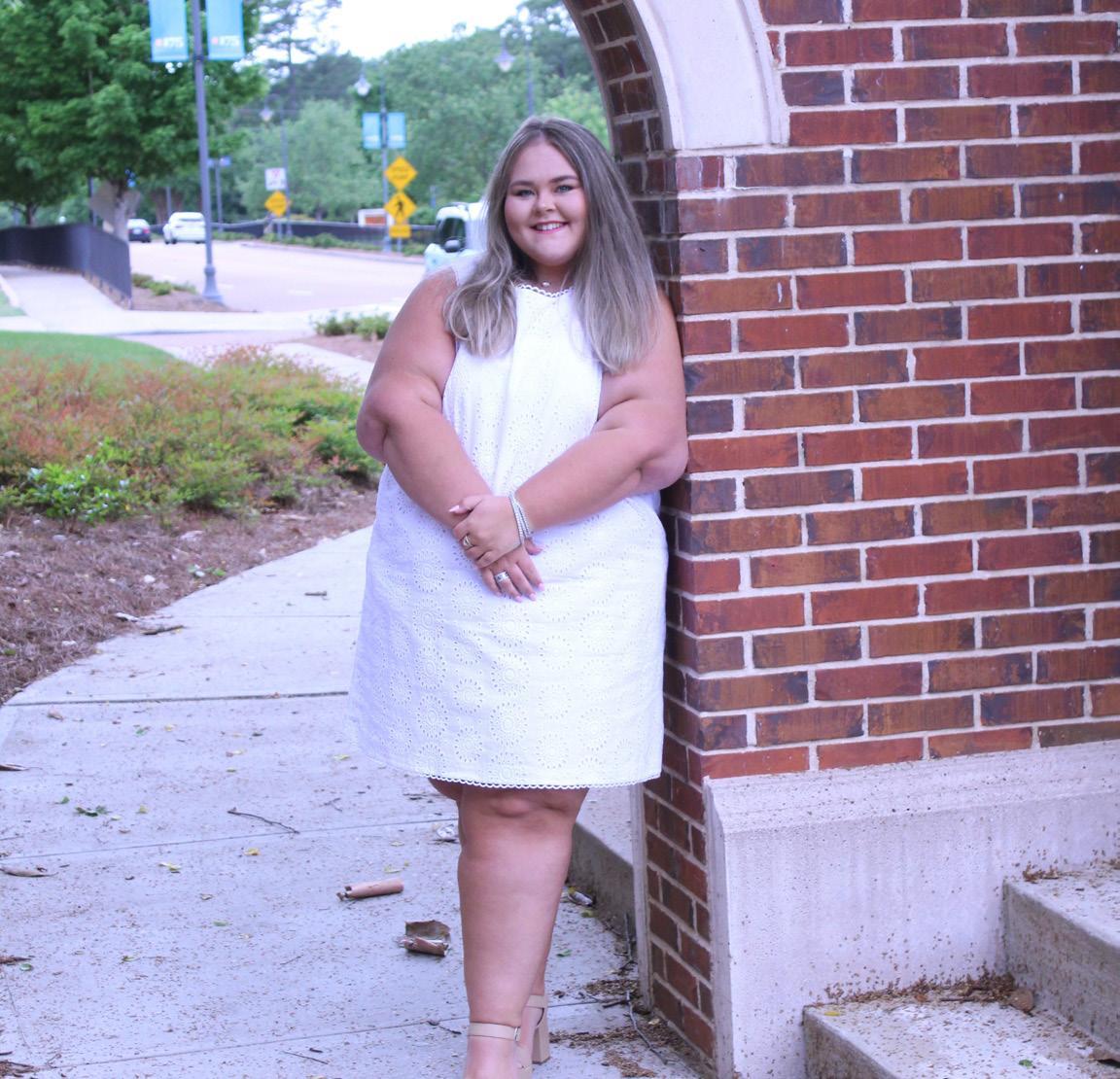
gle with location or anything like that. I feel like all the housing is close (to campus).”
The rent for the entirety of Davis’ house is currently $2,100, and each resident pays around $700 a month with utilities. The rent will be increased to $2,400 next year.
In Davis’ case, her fourth roommate left the house they shared during the fall the previous year, but the three remaining roommates still kept the four bedroom house due to lack of options.
about how expensive London is … and the fact that Oxford, a small town, had similar prices … I mean, granted, you’re getting more space for what you’re paying, but still, the fact that the places are going for over $1,000 a month … shocked me.”
By opting for an apartment with cheaper rent that is farther from campus, she had to purchase a car, adding to her daily living expenses.
In addition to cost, Knox-McConnell also noted

how living in an SEC town came with its own unique issues.
“The (one) place that I was looking at, she said that one of the stipulations was that I would have to move out every game day because she rented out the place for game days,” Knox-McConnell said. “And so that was one of the reasons why I didn’t choose that place, because it would have been a pain.”
Knox-McConnell also noted specific challenges that international graduate students face in finding housing in Oxford.
“It can be quite difficult to lock in a place because … you kind of need to get the visa before you apply for housing, but you need the housing to apply for the visa,” Knox-McConnell said. “So you’re kind of in a catch-22 situation.”
Elizabeth Van Keuren, a second-year master’s student studying integrated marketing communications from Jupiter, Fla., serves as the University of Mississippi Graduate Student Council Director of Housing.
Van Keuren explained that another common barrier for graduate students is finding a space to live that is not shared with undergraduate students.
“(Graduate students) don’t want to live with a bunch of undergrad students because … it’s very demanding for them. They don’t want to have to worry about people constantly coming in and out of their house if they are living with someone who is younger than them,” Van Keuren said. “We have a bunch of students who are okay with that, but when they’re so focused on their studies … that’s really a massive piece.”
Knox-McConnell utilized her connections with a former international student to find housing that worked for her. Knox-McConnell is at UM through a part
nership with the Center for the Study of Southern Culture and the British Association for American Studies.
“I got in touch with the previous British student who was doing Southern studies, and he helped me find a place to stay,” Knox-McConnell said. “His best friend was moving
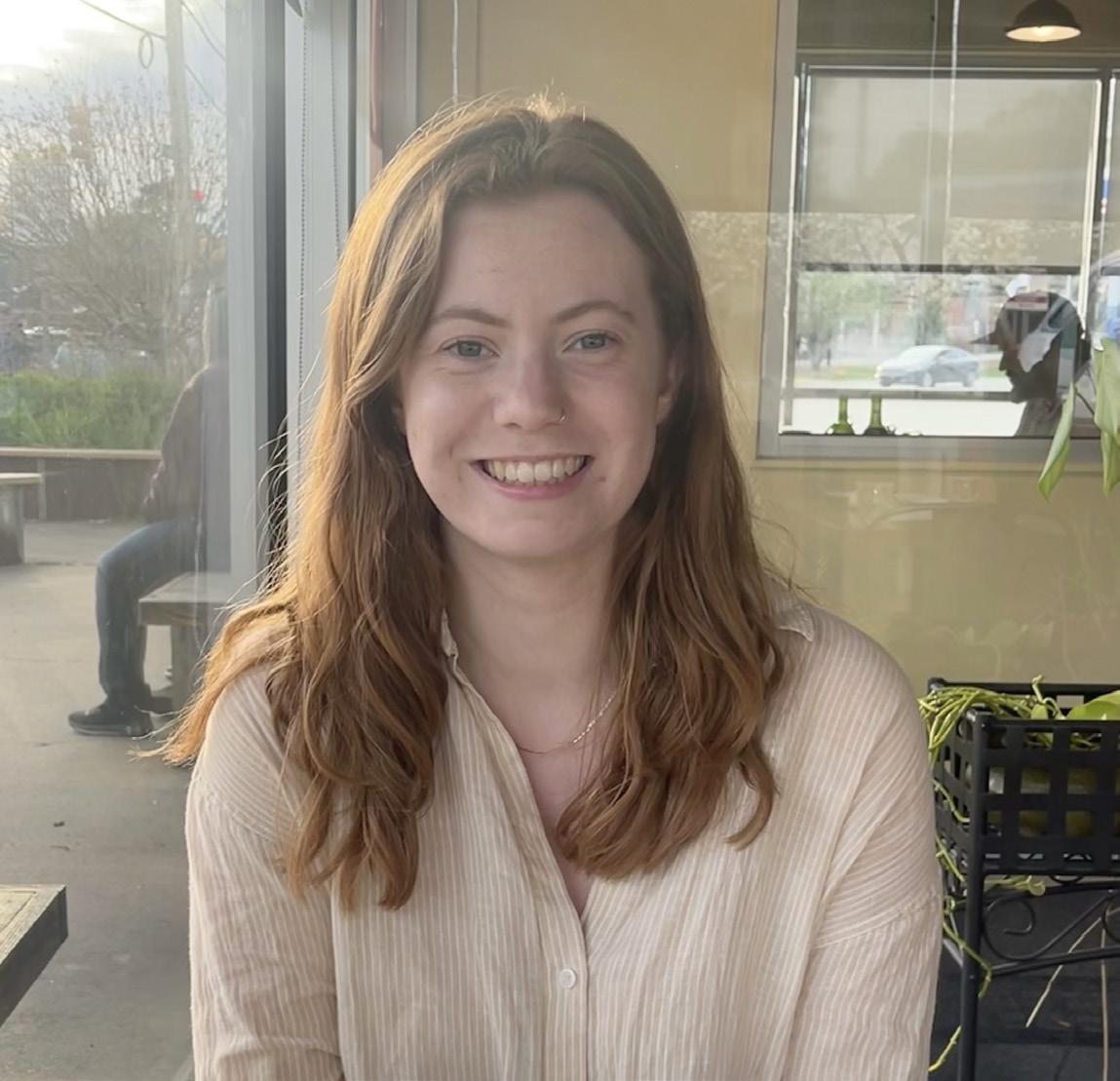
out of the room that I’m now living in … which was helpful, and I was able to vet the people that I’d be living with, so it wasn’t random people.”
Van Keuren encouraged all graduate students who are struggling with housing to reach out to the Graduate Student Council.
“There is always someone there who they can come talk to. They’re never alone in a fight, or a battle with
housing, or engagement or finding friends,” Van Keuren said. “And we just want them to know that we are here to foster connections and make sure (the) years they’re going to spend in Oxford are truly their most enjoyable years.”

CLAY HALE Editor in Chief
The University of Mississippi made headlines Wednesday as the only stop on Turning Point USA’s “This is the Turning Point Tour” to feature Vice President JD Vance and TPUSA CEO Erika Kirk, leading many to ask the question, “How was UM selected for this distinction?”
Chancellor Glenn Boyce told The Daily Mississippian that the university’s “trajectory” has played a part in why Vance and Kirk will only appear at UM over the course of the tour’s 11-stop duration.
“I just think that the trajectory of this university and the national visibility this university’s gotten over the last five-to-six years, in particular (is why Vance and Kirk spoke at UM). … I think as much as anything, we are now truly, truly on a national map in many, many
ways,” Boyce said. “This isn’t just our wonderful athletic program that has given us a lot of visibility — it’s the research we’re doing, it’s a tremendous faculty, who are taking students to a brand new level of academic achievement.”
Kirk, the widow of Charlie Kirk, who was shot and killed at a Turning Point USA event at Utah Valley University on Sept. 10, teased a Hotty Toddy chant near the beginning of her speech.
“Word on the street (is) you guys have a chant out there; I hear it’s a good one,” Kirk said, before the pavilion erupted in the Ole Miss tradition.
Kirk said that being on the UM campus was a “spiritual” moment for her. Wednesday marked seven weeks since her husband’s death, and she made a metaphor to explain what going back on tour means in his honor.
“Being on campus right now,

for me, is a spiritual reclaiming of territory. The more that I am coming to grips with the permanency of this nightmare, the more that I’m starting to realize and witness that the enemy, he doesn’t want you — he wants your territory,” Kirk said. “And when our team asked my dear friend Vice President JD Vance to speak today, I really prayed on it because, obviously, it’s a very emotional day, but I can just hear Charlie in my heart … say ‘Go reclaim that territory, babe.’”
Vance opened his speech with the familiar “Are you ready?” at the start of the Hotty Toddy chant. But the vice president never specifically mentioned a reason for speaking at UM on the “This is the Turning Point Tour.”
Still, other people have their theories.
Boyce credited the university’s public policy leadership major and number of students that have found internships and jobs in Washington, D.C., as another reason why the duo is appearing only at UM.
“We have an amazing amount of students who work in Washington (D.C.).
We have such a wonderful public policy program. It’s like student after student wants to go up there and be an intern,” Boyce said. “But then they go there, and they return, and they work, in all different capacities. And the buzz around Washington just happens to be about Ole Miss.”
Junior Trey McKean is one of those public policy leadership majors who traveled to Washington,








D.C., for an internship. Last summer, he interned at Van Scoyoc Associates, which is a lobbying firm.
McKean thought Vance’s and Kirk’s speeches mirrored the political climate of UM.
“I think we’re a pretty conservative campus. I think most people on campus support JD Vance, and I think it is great what Ms. Kirk is doing,” McKean said. “I do think (it aligns) with the campus’ values, but I also think it’s also important to kind of say, ‘Hey, this is not the only thing Ole Miss is about. We’re basically a campus of a lot of different perspectives,” McKean said.
“I am thankful to them for coming to Mississippi and to be able to be a part of this and be at this event,” McCrory said.
• Former • Practiced the
The concept of bringing people together is a sentiment that freshman marketing major Trevor Dickerson thinks led Vance and Kirk to the university.
• Taught Procedure for
• A member 1981.
• Former years.
“I feel like it’s a great thing that they chose Ole Miss,” Dickerson said. “I think it’s awesome that we get to see people that are still trying to connect with students, and I just think it helps to bring students even closer together after what happened (to) Charlie Kirk.”
Mississippi State University students, including sophomore accounting major Boston McCrory, were also in attendance, even though the speakers appeared at their rival school.
• Former Special Agent with the Federal
Kenzie Hall and Taylor Hill contributed reporting.
• Former years.
• Practiced at his privately owned law fi the same place, being the Oxford Square,
• Former Special Agent with the Federal Bureau of Investigation (FBI)
• Practiced at his privately owned law firm for 45 consecutive years- located at the same place, being the Oxford Square, Downtown, Oxford, Mississippi.
• Taught the Mississippi DUI Law and 5 different Criminal Law and Criminal Procedure courses each and every semester at the University of Mississippi for 29 consecutive years.
• Former Association;
• Former Special Agent with the Federal Bureau of Investigation (FBI).
• Taught the Mississippi DUI Law and 5 Procedure courses each and every semester for 29 consecutive years.
• A member of the Chancellor’s Trust at The University of Mississippi since1981.
• Former Municipal Prosecutor for the City of Oxford, Mississippi for over 6 years.
• Still practices at his privately owned law firm for 55 consecutive years - located at the same place, being the Oxford Square, Downtown, Oxford, Mississippi.
• Appointed Attorney Mandatory Vice
• A member of the Chancellor’s Trust at 1981.
• Former Municipal Court Judge for the City of Oxford, Mississippi for 8 years.
• Former Vice President and President of the Lafayette County Bar Association; member of the Mississippi Bar Association, etc.
• Taught the Mississippi DUI Law and 5 different Criminal Law and Criminal Procedure courses each and every semester at the University of Mississippi for 29 consecutive years.
• A Founding Harvard
• Former Municipal Prosecutor for the years.
Appointed by the Mississippi State Bar to the Mississippi Commission on Attorney Ethics and Attorney Violations of the Canon of Ethics and All Mandatory Rules concerning the Practice of Law. Occupied the positions of Vice Chairman and Chairman served for 18 years.
• A member of the Chancellor’s Trust at the University of Mississippi since 1981.
• Former Municipal Prosecutor for the City of Oxford, Mississippi for over 6 years.
• A Founding Member of the National College for DUI Defense conducted at Harvard Law School.
• Former Special Agent with the Federal Bureau of Investigation (FBI)
• Selected Advocacy
• Former Municipal Court Judge for the years.
• Selected Satisfaction
• Former Municipal Court Judge for the City of Oxford, Mississippi for 8 years.
• Practiced at his privately owned law firm for 45 consecutive years- located at the same place, being the Oxford Square, Downtown, Oxford, Mississippi.
• Former Vice President and President Association; member of the Mississippi
• Selected as one of the Top 50 DUI Attorneys in Mississippi by the National Advocacy for DUI Defense.
• Former Vice President and President of the Lafayette County Bar Association; member of the Mississippi Bar Association, etc.
• Taught the Mississippi DUI Law and 5 different Criminal Law and Criminal Procedure courses each and every semester at the University of Mississippi for 29 consecutive years.
• Former Special Agent with the Federal Bureau
• Selected as one of the Top 10 Best Attorneys of Mississippi for Client Satisfaction Award by the American Institute of DUI/DWI Attorneys.
• Selected Organization.
• Selected as one of the Top 100 Trial Lawyers by the National Trial Lawyers Organization.
• A member of the Chancellor’s Trust at The University of Mississippi since1981.
• Former Municipal Prosecutor for the City of Oxford, Mississippi for over 6 years.
• Recipient of the DISTINGUISHED AWARD OF MERIT for 1989 from the Mississippi State Bar given to one Attorney in the State each year for outstanding contributions to the practice of law.
• Former Municipal Court Judge for the City of Oxford, Mississippi for 8 years.

• Appointed by the Mississippi State Bar to the Mississippi Commission on Attorney Ethics and Attorney Violations of the Canon of Ethics and All Mandatory Rules concerning the Practice of Law. Occupied the positions of Vice Chairman and Chairman and served for 18 years.
• Former Vice President and President of the Lafayette County Bar Association; member of the Mississippi Bar Association, etc. Appointed by the Mississippi State Bar to the Mississippi Commission on Attorney Ethics and Attorney Violations of the Canon of Ethics and All Mandatory Rules concerning the Practice of Law. Occupied the positions of Vice Chairman and Chairman served for 18 years.
• Appointed by the Mississippi State Bar Attorney Ethics and Attorney Violations Mandatory Rules concerning the Practice Vice Chairman and Chairman and served
• Voted “Best Attorney in Oxford, Mississippi” in the Grove’s Choice Awards.
Member of the American Association of Premier DUI Attorneys.
• A Founding Member of the National College for DUI Defense conducted at Harvard Law School.
• Recipient
• Practiced at his privately owned law firm the same place, being the Oxford Square,
• Taught the Mississippi DUI Law and 5 diff Procedure courses each and every semester for 29 consecutive years.
• A Founding Member of the National Harvard Law School.
Member of the National League of Renowned Attorneys- Top 1% Awarded the United States Congressional Medal of Distinction by RNCC.
• Member of the American Jurist Institute - Top 10 DUI/DWI Attorney for Mississippi
• Selected as one of the Top 50 DUI Attorneys in Mississippi by the National Advocacy for DUI Defense.
Vice
• A Founding Harvard
• A member of the Chancellor’s Trust at the 1981.
• Selected as one of the Top 50 DUI Attorneys Advocacy for DUI Defense.
• Member of the American Society of Legal Advocates - Top 100 Criminal Defense Lawyers in the State of Mississippi.
• Selected as one of the Top 10 Best Attorneys of Mississippi for Client Satisfaction Award by the American Institute of DUI/DWI Attorneys.
• A Founding Member of the National College for DUI Defense conducted at Harvard Law School.
• Selected by the Attorney and Practice Magazine as one of Mississippi’s Top 10 Attorneys, et cetera.
• Selected as one of the Top 100 Trial Lawyers by the National Trial Lawyers Organization.
• Selected as one of the Top 50 DUI Attorneys in Mississippi by the National Advocacy for DUI Defense.
• Selected as one of the Top 10 Best Attorneys of Mississippi for Client Satisfaction Award by the American Institute of DUI/DWI Attorneys.
• Selected as one of the Top 100 Trial Lawyers by the National Trial Lawyers Organization.
• Recipient of the DISTINGUISHED AWARD OF MERIT for 1989 from the Mississippi State Bar given to one Attorney in the State each year for outstanding contributions to the practice of law.
• Former Municipal Prosecutor for the City years.
• Selected Advocacy
• Selected as one of the Top 10 Best Attorneys Satisfaction Award by the American Institute
• Selected Satisfaction
• Former Municipal Court Judge for the City years.
• Recipient of the DISTINGUISHED AWARD OF MERIT for 1989 from the Mississippi State Bar given to one Attorney in the State of Mississippi each year for outstanding contributions to the practice of law.
• Selected as one of the Top 100 Trial Lawyers Organization.
Listing of these previously mentioned areas of practice does not indicate any certification of expertise therein.
• Voted “Best Attorney in Oxford, Mississippi” in the Grove’s Choice Awards.
• Voted “Best Attorney in Oxford, Mississippi” in the Grove’s Choice Awards.
• Member of the American Association of Premier DUI Attorneys.
• Former Vice President and President of the Association; member of the Mississippi Bar
• Member of the American Association of Premier DUI Attorneys
• Member of the National League of Renowned Attorneys - Top 1%
• Member of the National League of Renowned Attorneys- Top 1%
• Awarded the United States Congressional Medal of Distinction by RNCC.
• Selected Organization.
• Recipient of the DISTINGUISHED AWARD the Mississippi State Bar given to one outstanding contributions to the practice
• Recipient the Mississippi outstanding
• Awarded the United States Congressional Medal of Distinction by RNCC.
• Member of the American Jurist Institute - Top 10 DUI/DWI Attorney for Mississippi
• Member of the American Society of Legal Advocates - Top 100 Criminal Defense Lawyers in the State of Mississippi.
• Selected by the Attorney and Practice Magazine as one of Mississippi’s Top 10 Attorneys, et cetera.
• Appointed by the Mississippi State Bar to Attorney Ethics and Attorney Violations Mandatory Rules concerning the Practice Vice Chairman and Chairman and served
• Voted
• Voted “Best Attorney in Oxford, Mississippi”
• Member of the American Association
• Member of the American Jurist Institute - Top 10 DUI/DWI Attorney for Mississippi
• Member
• A Founding Member of the National College Harvard Law School.
• Member
• Member of the National League of Renowned
• Member of the American Society of Legal Advocates - Top 100 Criminal Defense Lawyers in the State of Mississippi
• Selected by the Attorney and Practice Magazine as one of Mississippi’s Top 10 Attorneys, et cetera.
• Selected as one of the Top 50 DUI Attorneys Advocacy for DUI Defense.
• Awarded the United States Congressional
• Awarded
• Member Mississippi
• Member of the American Jurist Institute Mississippi
• Selected as one of the Top 10 Best Attorneys Satisfaction Award by the American Institute
• Selected as one of the Top 100 Trial Lawyers
• Member of the American Society of Legal Defense Lawyers in the State of Mississippi
• Member Defense

NOAH WALTERS
Assistant News Editor
More than 9,500 people filled The Sandy and John Black Pavilion on Wednesday to hear Vice President JD Vance and Turning Point CEO Erika Kirk speak, and even though they waited in a long line in rainy weather to get in, most students found the experience worth it.
Riley Darnell, a senior public health major from Houston, Texas, thought that Vance coming to UM reaffirmed what it meant to be a part of TPUSA.
“I think truly it just goes back to the Southern traditional values. I think that, you know, (as) the Turning Point chapter president (Lesley Lachman) has said, she really pushed to get him here,” Darnell said. “I think to honor that, Turning Point really wanted to come and show that they supported us and who we were … in their movement.”
Hannah Dean, a second-year graduate student in rehabilitation counseling at Mississippi State University from Houston, Miss., thought that the event was worth traveling for.
“It was fantastic. I’m glad I got to come. I really wasn’t expecting (students) to actually ask questions, so that was really cool. A lot of the questions I wanted to hear were asked, so that was fun,” Dean said.
Lucas Greazel, a senior mechanical engineering major from Chicago, Ill., thought that the event was well worth the chilly
continued from page 1
Johnson also criticized how TPUSA utilizes Christian and religious rhetoric to further their cause.
“I know that Turning Point was masterful in that area (of Christian nationalism),” Johnson said. “They take a piece of the Bible, misinterpret it, understanding that the average person really doesn’t know where that verse came from and what the true intent was, but that’s why I think it’s really taking it back to that basic level of what Christ taught.”
The goal of the event was to hold “a conversation that celebrates civic engagement, open expression and a campus that represents all voices — not just one ideology,” according to an Instagram post by the UM Democrats. Students were invited to ask questions after the speakers finished.
President of the UM Democrats and senior public policy leadership major Elizabeth Wildman
temperature and persistent rain.
“I really enjoyed the event and it was definitely worth the wait in the rain. It was cool to see that (Vance) didn’t cloister himself and shut down any questions he didn’t feel like answering, but responded with his raw personality,” Greazel said. “I think Ole Miss was a great place for him to come, and I believe this makes it the pearl of the Turning Point tour.”
Sonoma Baumgartner, a sophomore business entrepreneurship major from Chino, Calif., also believed that the event was worth weathering the rain.
“Before this event, I had to go to class, and then I was standing in line from like 12 (p.m.) until we got in around 3:30, so it was a big time commitment. But I think standing in the rain, all of that, it’s totally worth it for something like this. This is a once in a lifetime (experience),” Baumgartner said. “Standing in line, we saw a whole community of Mississippi students that all came together for this one event. It was fun to stand in line and meet people.”
Not every student who wanted to attend the event made it into the pavilion. Talia Fields, a sophomore early childhood education major from Hershey, Pa., was frustrated with being refused entry to the event.
“I definitely think they could have organized this better and either (had) two nights or a better ticket system, because I got tickets the second they went on sale. We didn’t get to go in, and I feel like a lot of people did get to go in that
said the catalyst for the town hall came from the TPUSA event and also referenced President Donald Trump’s preferential funding compact he proposed to nine universities across the country.
“Ultimately, we realized that we feel that Trump is trying to show dominance over higher education, especially with the compact academic excellence that was sent to schools recently,” Wildman said.
“So we just want to show that even though we’re in a conservative state and at a conservative school, that we are not beholden to one ideology.”
Calvin Wood, vice president of the UM Democrats and a senior public policy leadership major, said the town hall was organized to be inclusive to a range of voices.
“I think Turning Point often pretends to be a champion of free speech, and we wanted to show this as an opportunity for everybody in our community to come together and actually speak out, rather than a carefully chosen group of people to ask the vice president softball questions or to be humiliated by

probably just happened to get here sooner. And at the end of the day, we still do have classes and academics that we need to get to, so I didn’t have the opportunity to get here in line before 3 (p.m.),” Fields said.
For Caitlin McGrath, a senior Southern studies major from Lake Lanier, Ga., attending had a lot to do with the feeling that she would be participating in a historic event.
“I just want to be a part of making history in an event that people will talk about in future generations, saying that I was a part of it and having the opportunity as a college student to be able to see the vice president,” McGrath said.
Ladd Uvic, a senior integrated marketing communications major from Covington, La., said it was a major moment to experience and emphasized his belief that people on both sides of the political aisle will have something to take away from the event.
“It is so insane, especially for our university. I think no matter where you lean politically, this is going to be such a learning experience. Like, even if a Democrat was here, I feel like I would still go because it’s just such a learning moment,” Ulvic said. “And like we’re never going to be in college again having a president or a vice president on our campus, so it’s just such an amazing learning moment.”
Katie Brewer, a junior marketing major and Oxford native, noted that UM has hosted events like this in the past. In 2008, the university hosted
the vice president,” Wood said.
Thomas shared the impact of being placed on TPUSA’s Professor Watchlist, described on its website as “a carefully aggregated list sourced by published news stories detailing instances of radical behavior among college professors.” The site references Thomas’ viral tweets from 2018 that praised harassment of U.S. Sen. Ted Cruz, R-Texas.
“I was placed on the professor watchlist around 2019,” Thomas said. “Shortly after, I began receiving burial insurance advertisements in my mailbox on campus from an organization that says it aims to promote the free exchange of ideas. Turning Point’s Professor Watchlist has done anything but that.”
Thomas also spoke about how suppression of faculty speech can impact the educational experience for students.
“When our faculty suppress their speech, when we censor ourselves in our classrooms, when we effectively hide our expertise, all students suffer,” Thomas said. “None of you came to the University of Mississippi because you want to be told things you already think you know. … You came here because you want to participate in the free exchange and vetting of ideas, and that free exchange and vetting of ideas is the bedrock of our university and every institution of higher education.”
Khanna specifically took issue with Vance’s ideology.
“It’s sad to me that he’s forgotten the values he wrote about in ‘Hillbilly Elegy,’ because he grew up with an empathy for people who had been screwed by the economic system, who did not have the opportunities for good paying jobs,” Khanna said. “And out of his own ambition now and do-
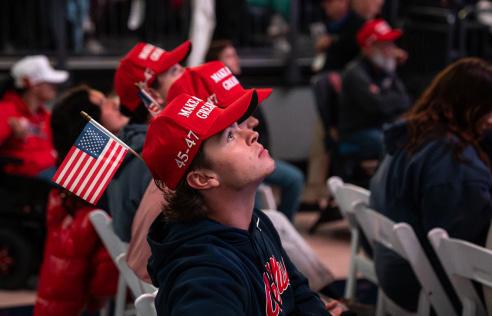
a presidential debate between Democratic nominee Barack Obama and Republican nominee John McCain.
“I think Ole Miss is a melting pot of a lot of different opinions. There’s a lot of history here, and I think it’s so great that (Erika) decided to come here (along with) JD Vance,” Brewer said.
For McGrath, Vance coming to the university has more to do with what she perceives as its overwhelming support for him and his party.
“(They know) that Ole Miss has that huge foundation of support, not only for Donald Trump, but for Charlie Kirk and just the Republican Party in general, (and) just knowing that we’d all show a lot of support and be a huge influence,” McGrath said. “(They know) that stuff can go
viral here and just get more word out to more people at an SEC school.”
For Dean, one question remained after the event concluded.
“I wanted to ask (Vance) about if he was planning on running for president, and I wish somebody had asked if that’s something on his radar at all,” Dean said. “I know a lot of people are rooting for it.”
Erika Dierke, Taylor Hill, Hannah Ivey and Aidan Poniatowski contributed reporting.
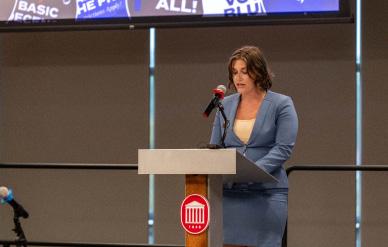
ing Donald Trump’s bidding, he seems to have forgotten all of that.”
Sophie Kahle, a junior political science and psychology major from Ocean Springs, Miss., said she enjoyed the town hall format rather than a protest.
“I like this town hall style more, just because it feels more structured and organized and just representative of the Democratic Party,” Kahle said. “I feel like it encourages listening and intelligent conversation, which I think is something that can be hard to do at a typical protest.”
Lauren Graves, a senior public policy leadership major from Denver, appreciated that the event showed off a different political opinion than the TPUSA event.
“I think it’s really important to show that the University of Mississippi is diverse, not just in how the students that go here look, but also how we think,” Graves said.
Wildman said she hopes the event connected students with similar beliefs.
“I feel like a lot of times here
(at the university) you can feel like you’re in this conservative bubble, and there’s no one else that thinks the same way as you,” Wildman said. “I just want people and students to know that that’s not true, and there are a lot of people that are here for them as well.”
President of the UM chapter of TPUSA and junior public policy leadership major Lesley Lachman expressed disappointment in those who chose not to attend the TPUSA event.
“You’re missing a monumental moment of the vice president coming to the university,” Lachman said. “He chose Ole Miss for a reason, regardless of political view. This is a huge deal for our university. So if you want to miss that monumental moment, you can.”
Madelyn Lass contributed reporting.
JAYLYNN CONNER A&C Editor
KENZIE HALL News Staff Writer
Multiple security measures were implemented on the University of Mississippi campus by university, state and federal law enforcement agencies in preparation for Vice President JD Vance and Turning Point USA CEO Erika Kirk’s appearance at the “This is the Turning Point Tour” stop at The Sandy and John Black Pavilion on the University of Mississippi campus Wednesday.
Officers from various departments patrolled the area around the pavilion as attendees began to line up as early as 10:15 a.m. Metal barricades were placed around the pavilion to keep the line contained.
Agencies involved in the security effort included the United States Secret Service, the Transportation Security Administration (TSA), federal and local SWAT teams, the Lafayette County Sheriff’s Department, the Mississippi Highway Patrol Special Operations Group, the Mississippi Department of Public Safety, the Mississippi State University Police, a Weapons of Mass Destruction Civil Support Team and the pavilion’s normal security guards from Shielded Security. The Oxford Fire Department and several ambulances were also present.
Before entering the barricaded area surrounding the pavilion, attendees were instructed to leave any prohibited items — including bags, beverages, umbrellas and chairs — on a table. A canine from the United States Secret Service Canine Explosives Detection Team sniffed for any trace of weapons as well. Upon entering the building attendees were also required to go through metal detectors that were supervised by TSA and the Secret Service.
While waiting in line for the event, several students said they were not anxious about their safety.
“I feel very safe,” Haley Padget, a sophomore biological sciences major from Brandon, Miss., said. “There hasn’t been a moment where I haven’t (felt safe). It’s normal to
feel a little nervous about this.
I mean, we’re seeing the vice president. I’ve seen a lot of police officers and ambulances over there. I feel like (the level of security) is perfect.”
Brady Anderson, a junior business marketing major from Seattle, attributed his feeling of safety to the authorities present.
“I haven’t felt unsafe at any point today,” Anderson said.
“I think there’s enough Secret Service and law enforcement here to keep all of us safe.”
Mississippi State University student Andrew Swan drove with a friend from Starkville, Miss., the morning of the TPUSA event. He said police officers were posted along the route.
“When we were driving here from Starkville today, when we got within 10 miles (of Oxford), there was a cop at every exit and everything. They were everywhere,” Swan said.
Safety was a concern for some students who wished to organize a protest to the TPUSA event.
“We did consider doing a protest, but ultimately, with just how protests have gone in the past here at the university, we knew that a lot of people would have a lot of safety concerns, especially with such a big figure like JD Vance being here,”
Elizabeth Wildman, president of the University of Mississippi College Democrats, said.
Instead, the College Democrats held a town hall meeting in the ballroom of the Gertrude C. Ford Ole Miss Student Union.
“We decided … (for) people to feel like they had a safe space to come and talk, it would be a lot better just having it in the union ballroom and do a town hall,” Wildman said.
Although campus offices and classrooms were open as usual, several students reported their professors canceled class due to expected traffic delays and crowds on campus for the event.
“My professor originally said we would have class, but then he emailed us on Tuesday and said that upon review and guidance from administration, class would be canceled due to logistical concerns because of the event,” Jennifer Nieberlein, a senior law studies major from Denver, said.
Barricades were erected to block off the roads leading to
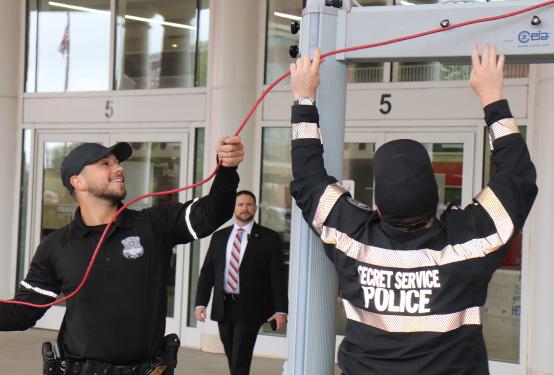
Secret Service officers set up metal detectors outside The Sandy and John Black
before the Turning Point USA event on Oct. 29.
The Sandy and John Black Pavilion. Starting at 7 a.m., portions of Hill Drive, beginning past the entrance of Big Valley Lot and extending to All American Drive, were closed.
Portions of All American Drive, from the Lloyd Bell Tower outside of Vaught-Hemingway Stadium to the Martindale-Cole Student Services Center, were also closed.
Oxford-University Transit (OUT) bus routes were altered to accommodate the closed roads. Instead of dropping off at the bus stop, the Green, Teal, Red South, Orange and Hathorn bus routes dropped off at the Paris-Yates Chapel. Gold, SOC, Gold Express and Pearl Express dropped off at the Gertrude C. Ford Ole Miss Student Union.
The pavilion parking garage and the parking lots around the Turner Center were closed at 6 p.m. on Tuesday and remained closed on Wednesday.
Jessica Johnson contributed reporting.
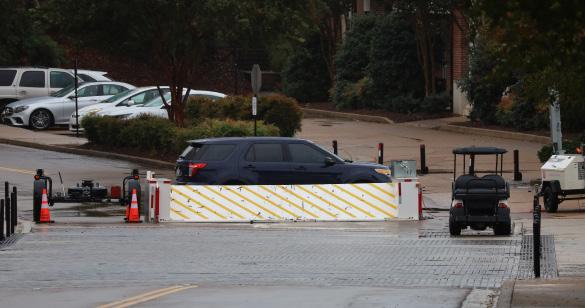

AKAYLA HUGHES
News Staff Writer
The University of Mississippi chapter of Delta Kappa Epsilon held a memorial service to celebrate the life of fraternity brother Knox Boudreau, a sophomore accountancy major from Decatur, Ga., in front of its house on Fraternity Row at 5 p.m. on Tuesday, Oct. 28. Students and community members gathered on the front lawn for the ceremony. Boudreau was found dead by the Lafayette County Sheriff’s Department off of Lafayette County Road 303 on the
continued from page 1
from Falkner Farms — a multigenerational, regenerative cattle and poultry operation. The Falkners were most concerned about the precedent the rezoning could set for heavy industrial operations disturbing rural agricultural land.
Falkner Farms published a press release on Wednesday thanking community members and government officials for their support over the past month.
“From the beginning, our request has always been for a location where all parties can operate in a way that benefits our community,” the press release said. “Growth in Lafayette County is inevitable, but so is our commitment to responsible land stewardship. We’ll continue to advocate for agriculture and work toward a future that balances progress and preservation.
Lafayette County Administrator Kate Victor said the board of supervisors will release a statement on the county’s social media pages this week.
None of the five members of the board of supervisors responded to The Daily Mississippian’s request for comment on McCurdy’s change in plans by the time of publication. These members are Board President Brent Larson, Tim Gordon, John Morgan, Scott Allen and Greg Bynum.
Gordon, the District 3 Supervisor, said via phone that he had not heard of the relocation plans before The Daily Mississippian’s request for comment.
morning of Friday, Oct. 24.
No details regarding Boudreau’s death have been released, though the sheriff’s office ruled out foul play.
During the candlelight ceremony, attendees spread the flame from one person to another as they expressed support for each other.
There was also a time of reflection and prayer. One event speaker led a reading of Bible verses Matthew 11:2829, while the song “Heading South” by Zach Bryan played in Boudreau’s honor.
UM’s chapter of Delta Kappa Epsilon made a
Shawn Edwards, mayor of Taylor, Miss., said he was pleased with the decision to relocate the proposed plant site, calling the change a “win-win for all.”
“I think the supervisors did a good job, (and) Mr. McCurdy, to come up with a plan that is basically in the best interest of everybody,” Edwards said via phone.
While the original proposed site on Highway 328 is about three miles from the Taylor town center, increased traffic and proximity to residents closest to the plant were major causes of concern among members of the community.
“The impact that we were concerned about was heavy truck traffic from the asphalt trucks … plus many of our residents would be … within a mile and a half of the projected site,” Edwards said. “I’ve talked to those folks, and they’re very happy and very pleased with the decision.”
At its new proposed location, Magnolia Materials will produce up to 2,000 tons of asphalt per day, potentially lowering the cost of asphalt locally. According to McCurdy’s press release, Lafayette County currently pays 17% more than the state average for asphalt.
The press release also indicated that the original proposed plant site on Highway 328 “will be freed for other commercial growth.” In an email exchange with The Daily Mississippian, McCurdy called the original planned site a “textbook commercial-industrial district.”
“Our (Highway 328) site still is superior to the indus -

statement regarding Boudreau’s death on Instagram:
“Knox was the kind of guy who could light up any room. Always laughing, full of energy and always there for the people around him. He had big goals, a huge heart and a way of making everyone feel like family. Our brotherhood was better because of Knox. His positivity, humor and genuine spirit will stay with us forever.”
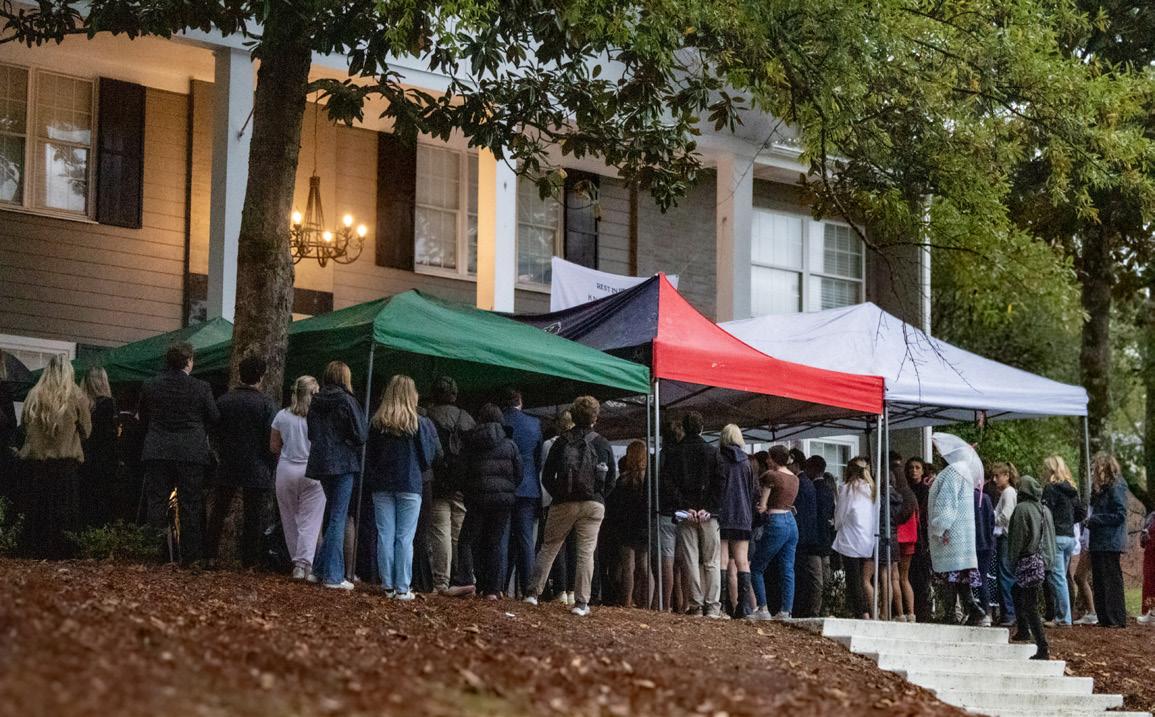
CONTACT THE NEWS DESK AT thedmnews@gmail.com

Reed Falkner
trial park for many purposes. Abutting a forthcoming four-lane, situated between commercial uses, across the street from a commercial use, on a state-owned road and a few thousand feet from the City (of Oxford) sewer plant,” McCurdy said in an email.
McCurdy said he has no knowledge of how the board of supervisors’ Nov. 3 vote would have gone if he proceeded with his rezoning efforts.
“Contrary to public belief, I don’t know any more than any other county resident as to what might happen,” McCurdy said. “There’s no secret in this process. We build our developments on solid facts and present them for approval. That’s what we did here, and that’s what we’ll do going forward.”
Redesigning plans for a new Magnolia Materials site will be costly, McCurdy said.
“There are a whole handful of new challenges and risks we’ll have to address. But, that’s just something I chose to take on, as I said, for the sake of peace,” McCurdy said.
Moving forward, McCurdy is focused on addressing the need for local development.
“Lafayette County is facing explosive growth, and we need to be working with the County to give it more options, not fewer, to respond to this growth,” McCurdy said. “We’ll all do a

That’s how I’m proceeding.”
DYLAN THOMAS News Staff Writer
The University of Mississippi Associated Student Body Senate held its third meeting of the 202526 school year on Tuesday, Oct. 28 in the Gertrude C. Ford Ole Miss Student Union auditorium. At the meeting, the senate passed numerous pieces of legislation and approved new senators. The senate also observed a moment of silence for Knox Boudreau, a UM student who was found dead on Friday, Oct. 24.
Two ASB Senate Proclamations also were approved. The first proclamation’s purpose was to honor the Fulton Chapel Protest, the Ole Miss 8 and the scholarship created by the university in the name of that protest and the people who attended it.
The Fulton Chapel Protest in 1970 highlighted Black students’ dissatisfaction with ways they were being treated by the university.
This protest was recognized by the university earlier this year when a plaque was erected in front of Fulton Chapel. The proclamation recognizes not only the protest but also the recipients of the scholarship created in its name. The proclamation was passed unanimously.
The second proclamation’s purpose was to show ASB Senate’s support for LGBTQ+ students on campus.
“We have a population on campus that does not feel represented. In our creed, we have to honor and respect the dignity of each person,” Senator Blake Williamson, who presented the legislation, said. “If our constituents come (to) us with concerns, I feel like we need to address those.”
Senator Nick Menendez made an objection on the grounds of religion.
Menendez cited catechism 2357, which describes homosexual activity as “acts of grave depravity” and “contrary to the natural law” and that “Under no circumstances can they be approved.”
The resolution passed in a non-unanimous senate vote.
ASB also passed 10 bills unanimously, all of which adjusted language in the ASB Senate Code to edit out redundancies and inconsistencies.
The senate then presented six resolutions covering a variety of
“(The university) raised a placard honoring that protest that happened at Fulton Chapel, and they also created a scholarship in which they honored those students,” Chairman of Inclusion and Cross-Cultural Engagement Jalon Hightower said. “The reason why we chose to highlight the scholarship winners is primarily because this is the first time this scholarship … has recipients.”
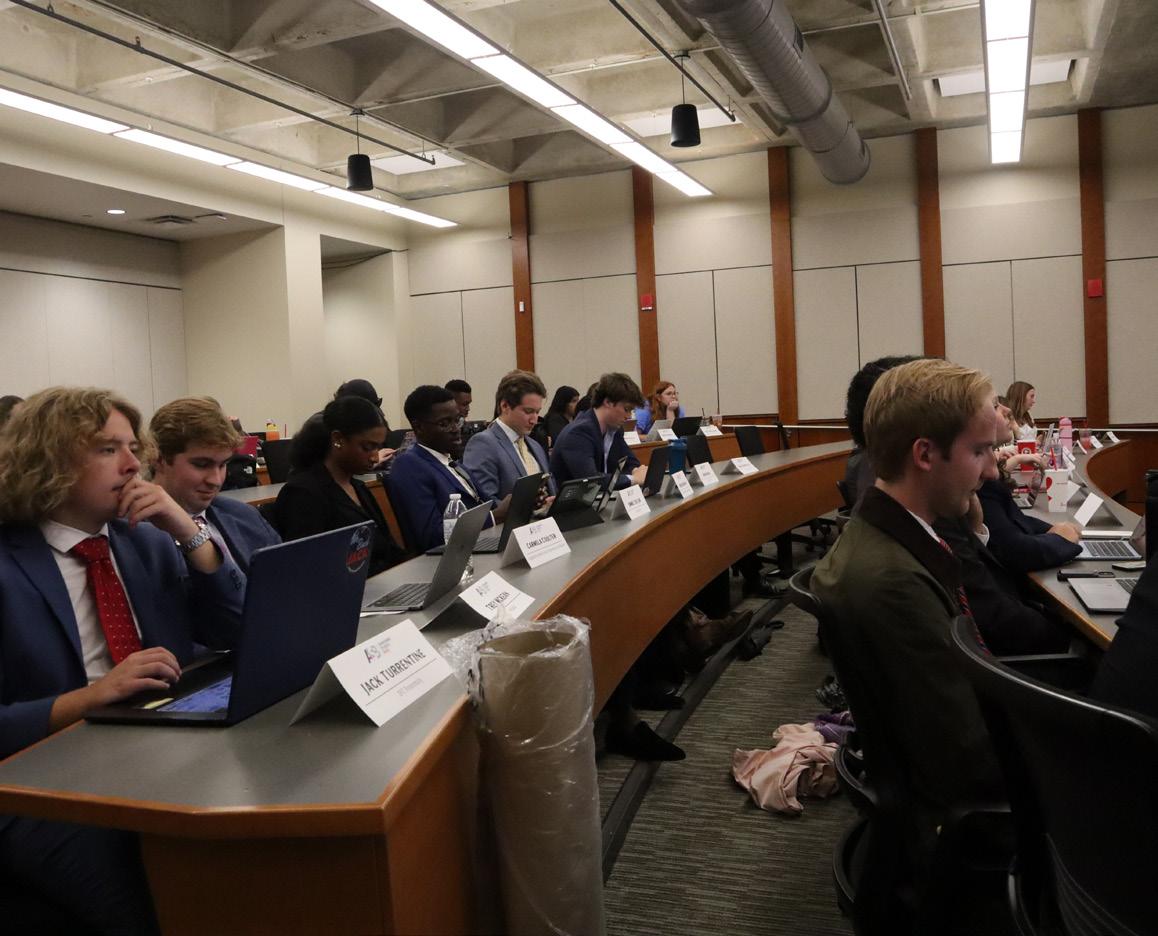
issues, particularly regarding the infrastructure on the UM campus.
SR 25-12 addressed the presence of micromobility transportation devices on campus and the regulations concerning where the devices can travel, including whether they have right-of-way on crosswalks or sidewalks and where those devices can be parked. Micromobility transportation devices include vehicles such as electric scooters and bikes.
Chairman of Infrastructure Williamson and Senator Fred Williams presented the resolution after ASB received student complaints regarding electric scooters on campus.
The senators found that the university has regulations restricting where micromobility transportation devices can be ridden or parked, but these regulations are not enforced to the fullest extent according to the university policy. SR 25-12 was about creating an initiative that would make the student body more aware of the university’s already existing policy and promote an effort to enforce it.
“Moving forward we’re going to give to y’all a ‘no wheels’ policy,” Williamson said. “We’re not bringing in any new rules and regulations, we’re just educating people with signage, education initiatives, public service announcements and collaboration in all departments.”
Other resolutions dealt with repairs and replacements done to water fountains in the Turner Center and at the pickleball courts, the installation of a crosswalk on Fraternity Row, the addition of new landmarks including family restrooms to the university interactive map, new accommodations to be implemented in campus dining options for Jewish students during Passover and an increased effort to put QR codes with university disaster protocols on the back of doors in on-campus housing.
ASB also posted a message via Instagram Wednesday morning regarding private funding for registered student organizations. Earlier this semester, in a response to Mississippi House Bill 1193, the university discontinued RSOs’ direct access to Student Activity Fee money.
“ASB has established a UM Foundation account to provide private funding in support of reg-
istered student organizations. This funding is intended to assist with operational and promotional costs,” ASB said in a statement via Instagram. “The amount of funding available will depend on contributions to the account.”
ASB has set up a form for RSOs to use to request funding from this new account.
ASB also approved two newly elected senators. Jalyn Brock, a sophomore political science major from Mantee, Miss., and George Monroe, a freshman accountancy major from Oxford, were approved during Tuesday’s meeting.
Brock wants to use her position to advocate for sports that she believes are less attended, and she hopes to champion initiatives to increase student involvement in the crowds at those sports’ games.
Complete the grid so that every row, column and 3x3 box contains the numbers 1 through 9 with no repeats.
“I brought up proposing a points-based system for students who attend smaller sporting events and to incentivize going to those under-appreciated sports,” Brock said. “I’ve always enjoyed some of the smaller sports, like tennis, volleyball (and) track and field, things like that, and I think that those athletes deserve to be supported just as much as football players, basketball players, things of that sort.” Monroe hopes to use his new position to focus on mental health on campus, specifically by working with the William Magee Center.

“For me in high school, when I was a part of my mental health outreach group … we were trained by one of the leaders of the William Magee Center. … We became certified peer educators, which basically meant that we were allowed to teach our fellow students about topics on stress and anxiety,” Monroe said. “So early on, even in high school, I knew what a great resource the Magee Center was, and now (that) I know that as a freshman, I want to work with them even more, especially when it comes to student leadership.”

“Throughout the event there was a clear and consistent message: The best way to continue the mission of Charlie Kirk, namely freedom of speech, conservative principles and limited government, is to get involved,”
TYLER BOECKER
Opinion Staff Writer
It’s not every day that history is written right on your college campus. It is even less often that the vice president of the United States of America speaks directly to a university’s students, not to secure votes, but to inspire youth action.
Wednesday’s Turning Point USA event, featuring TPUSA CEO Erika Kirk and Vice President JD Vance, reveals the political relevance and impact that the University of Mississippi has nationwide.
This rally also represents the diligent efforts the university and registered student organizations take to cultivate a campus that promotes and fosters discussions across the ideological spectrum.
Throughout the event there was a clear and consistent message: The best way to continue the mission of TPUSA founder Charlie Kirk, namely freedom of speech, conservative principles and limited government, is to get involved.
A clear pillar of this philosophy is that no matter how bad things are, we cannot stop fighting as a generation for the things we care about.
“If you care about this country, love it enough to get involved in the process of how we govern it,” Vance said Wednesday.
Regardless of one’s opinion, they should empower themselves to do something about it, no matter how daunting it may seem.
While this concept is not novel, TPUSA’s commitment to empowering students to be politically active brings revival to this civic duty.
This was especially true in the role that students played in organizing the event from the Ole Miss TPUSA chapter advocating for a stop on the American Comeback Tour to the presence of dozens of student volunteers and the opportunity for students to ask questions of the vice president.
Throughout the question and answering period, students from all sides of the political aisle were able to ask direct questions to one of the
most powerful people in the country.
Vulnerability is rarely something politicians subject themselves to. Vance’s willingness to provide candid and thoughtful answers as opposed to spewing talking points reflects the authenticity of TPUSA’s love for dialogue that is authentic and impactful.
Most profoundly, the event marked seven weeks since the assassination of Charlie Kirk. His death was a key undertone of both Vice President Vance and Erika Kirk’s speeches.
The impact of faith in their lives was reflected in the call to continue Charlie Kirk’s mission: Erika spoke about how every morning her husband lived through thinking about how he could serve God and how he could help other people.
Thus, this event displayed what makes Ole Miss such a special campus: our commitment to fostering a community built on civil discourse and empowering students.
Tyler Boecker is a sophomore economics major from Aurora, Ill.

CONTACT THE OPINION DESK AT
not represent all of the
“Yet fear is not what keeps people quiet. It is fatigue — fatigue with a politics that reduces ordinary people to just numbers and votes.”
PAUL WINFIELD II
Opinion Staff Writer
The Turning Point USA event at the University of Mississippi at The Sandy and John Black Pavilion on Wednesday, which featured Vice President JD Vance and TPUSA CEO Erika Kirk, was marketed as a moment of revival and unity for young conservatives on campus and beyond.
The line was long, the cameras were rolling and the stage was set as a grand celebration of the vice president and the legacy of the late TPUSA founder Charlie Kirk.
But if you stepped outside the arena, campus life went on — quieter than usual, but, nevertheless, on.
Nearly 9,000 students attended the rally, but more than twice that number stayed home. The silence beyond the arena says perhaps just as much about the state of American politics as the cheers inside.
The vice president told the crowd, “We have got over 10,000 students from across Mississippi … and we know that you are the future of Charlie Kirk’s legacy.”
But the words carried a sense of exclusivity, as if those students present were the only ones with futures worth claiming.
Vance’s and Kirk’s remarks were filled with moral language and familiar slogans about faith, family and freedom.
“Fall in love, get married and start a family,” Vance urged, presenting a nostalgic image of what young people should strive for.
It was the kind of message that sounds wholesome until you remember what life looks like for millions of Americans today.
According to the U.S. Department of Agriculture, nearly one-infive American households with children faced food insecurity last year.
With the federal government shutdown, those numbers are likely to grow. The shutdown will delay and halt SNAP and WIC benefits (more commonly known as food stamps), disrupt school meal programs and freeze federal nutrition assistance for families already stretched thin. It will also slow access to Medicaid processing and housing support, forcing millions of working-class Americans to live in uncertainty.
Notions of love and family mean little to those who depend on decisions from Washington to decide whether they can afford groceries,
The university, however, has more than 27,000 students, several of whom either disagreed with the event’s message or felt it had nothing to offer them. That is the real silent majority, not the one applauding in the stands, but the one that politics continues to overlook and underestimate.
health care or rent next month.
When Vance was pressed by students on issues that demanded clarity, his answers drifted toward abstraction. One student asked a straightforward question about immigration limits, and he mentioned his girlfriend, who studies here on a visa.
Vance avoided specifics and instead referenced 1920s immigration laws that once enforced racial quotas, rambling about how our country must have time to “assimilate.” It was a typical politician’s answer — a non-answer.
Even the corporate backdrop of the event felt off. The program was sponsored in part by Yrefy, a private loan refinancing company that profits from student debt. It is challenging to take a rally about freedom seriously when it is bankrolled by corporations that depend on young people remaining in financial bondage. The disconnect was visible everywhere.
The truth is that the real silent majority at Ole Miss was not inside the arena but outside it — among students who felt unseen or excluded by the event’s tone.
“You can’t change a nation if you are enslaved to fear,” Vance said to the crowd.
Yet fear is not what keeps people quiet. It is fatigue — fatigue with a politics that reduces ordinary

people to just numbers and votes.
If this event was meant to be “the turning point,” it turned its back on theverypeopleitclaimedtospeakfor.
Paul Winfield II is a public
policy leadership and economics major from Vicksburg, Miss.
emailed to thedmopinion@gmail.com. Letters should be no longer than 300 words. They may be edited for clarity, brevity and libel. Third-party letters and those with pseudonyms or no name will not be published. Letters are limited to one per individual per month. Letters should include contact information, including relationship to the university, if applicable.

Increased Calorie Burn
Detoxification
Lower Blood Pressure
Anti-Aging & Skin Rejuvenation
Improved Circulation
Weight Loss

